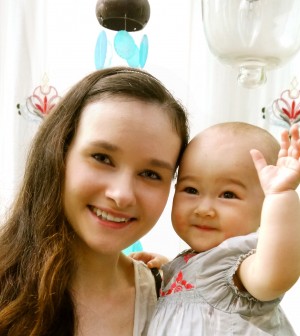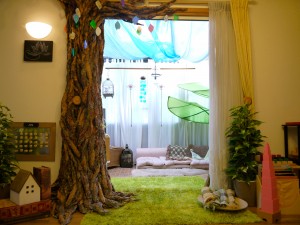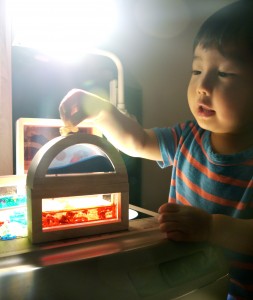- Belgium comes to Yamashita Park
- Residential Villa in Phuket Entices Remote Workers With Long-Stay Rates
- Rare pieces of French glass art at the Mirai Museum of Art
- Feast on fresh fish and seafood at the 2024 ‘Sakana’ Festival
- Would you like to ride in a Louis Vuitton gondola lift?
- Naked Snow Aquarium
- Festive lights at Yomiuriland will get you feeling the holiday vibes
Mom from New York opens a school inspired by Montessori and Reggio Emilia

New Yorker Sybrina Ignatieva-Wada came to Japan in 2008 for a one-year visit after her university studies in New Zealand. Smitten by Japan, she decided to make it her home.
Sybrina founded tinyHappy Garden International School for preschoolers and kindergarteners inspired by two philosophies. Tf finds out more.
Sybrina travelled to different countries as child with her parents who were in the United States Army. “I was fortunate to have been able to travel to different countries with them from a young age. Growing up in New York was a great experience: having pets, lots of space to play and explore, surrounded by nature, and of course plenty of snow in winter!” Sybrina says of her childhood.
“My dad is a great storyteller, really getting into all the characters, and I never tired of his bedtime stories. Every week we did karate and played tennis together. My mom was always very energetic and we used to sing together everywhere we went – in the car, at the store – we didn’t care who was watching us and we especially loved the Sound of Music,” she added.
How did the idea of opening up a school come about?
Well, it was always my dream to open my own school, ever since I was little. I used to set up all my stuffed animals and teach them the alphabet! After university and working for several different schools here in Japan, I was able to gain lots of hands-on experience with different teaching methods/approaches and really develop my own teaching style. I liked the idea of having a school in a house, like a home away from home. While on maternity leave, my husband and I moved to a new house and he encouraged me to follow my dream!
Tell us why you named your school “tinyHappy Garden”.
When I think of my students, I recall so many pleasant memories that I will cherish for a lifetime. Even though children are small, they bring so much energy and joy to the classroom, so I brought tinyHappy together. Garden is a bit of a play on words because it comes from the German word kindergarten, or children’s garden, and secondly, because our house has a lovely garden with a large sakura tree, fruit bushes and trees and space to grow vegetables and flowers. The garden and nature has a large presence in our classroom. Besides the sheer fun of getting amongst it, there is so much one can learn from putting their hands in the earth and helping something grow.
 tinyHappy Garden International School adopts two philosophies: the “individual” Montessori and “group-centric” Reggio-Emilia. What can children benefit from programs inspired by two different educational approaches? In general, these two approaches are very different, but both methods are child-led and focus on the child’s sensitive periods, their interests – what the child wants to do when they are ready to do so. The materials that the Montessori method employs are beautiful, made from natural materials, and best of all, self-correcting, so the children are free to make their own discoveries. We give students ample time to work with these materials and then come together as a group for thematic activities and projects, which is more Reggio style. As for the benefits, it’s good to be flexible and try new things. Just like branches of a tree, we can grow and take our education in many different directions. To say “we are only one way and will always do things this way, and never change” is a very naive way of thinking. As time passes, each and every one of us will make changes as we experience life’s adventures. There is often more than one way to find a solution to a problem, so it is important to be open-minded, creative thinkers.
tinyHappy Garden International School adopts two philosophies: the “individual” Montessori and “group-centric” Reggio-Emilia. What can children benefit from programs inspired by two different educational approaches? In general, these two approaches are very different, but both methods are child-led and focus on the child’s sensitive periods, their interests – what the child wants to do when they are ready to do so. The materials that the Montessori method employs are beautiful, made from natural materials, and best of all, self-correcting, so the children are free to make their own discoveries. We give students ample time to work with these materials and then come together as a group for thematic activities and projects, which is more Reggio style. As for the benefits, it’s good to be flexible and try new things. Just like branches of a tree, we can grow and take our education in many different directions. To say “we are only one way and will always do things this way, and never change” is a very naive way of thinking. As time passes, each and every one of us will make changes as we experience life’s adventures. There is often more than one way to find a solution to a problem, so it is important to be open-minded, creative thinkers.
Tell us about your staff, and who are your programs for. Besides myself, there is currently one other teacher, Miss Yuki, attending every day at school. Yuki holds a Japanese early childhood license and has teaching experience in Japan and abroad in the USA. Her positive energy and kind heart draws the children in and her creativity is boundless! We are a great team – it’s so nice to have found someone with similar views on early childhood education and who is as passionate about teaching as I am! From January, we will also be welcoming a teacher from England, Miss Josie. She is currently teaching at an international school in Germany and she will be coming to Japan to visit us in October. Josie also has lots of experience with children and can play the ukelele. Yuki and I are really looking forward to learning how to play, too!
tinyHappy Garden is a school for everyone. Families of all nationalities and cultural backgrounds may join and we really hope to welcome families from all walks of life. We offer a full-day kindergarten program (3-6 years old, 8:30am-3pm) and a full- or half-day preschool program (18months-3years). Our infant program (Koru Class) is the most flexible, with full- or half-day programs available from 2 to 5 days per week. Instruction is done in English and every month we explore new themes: one seasonal and one cultural. Everything we do at school is a hands-on learning experience, through cooking, music, traditional story telling and finger plays, gardening, sensorial play and art. The teachers document the children’s day by taking photos and notes and we love to communicate openly with parents. In the future, we do plan on expanding our programs, such as an afternoon kinder and adult English lessons as well.
Our Mum’s Tea is a weekly event held every Tuesday and Wednesday after school from 3:30pm~5:30pm. Entry is free and tea is provided. While we do hope to build awareness about our school, the event is mainly a support group for mums to gather together for a couple hours while their children play in our classrooms. Those with children 6 and under can attend and expecting mothers are welcome, too!
Having travelled to many cities and experienced different cultures as a child, what, in your personal opinion, should be the focus of learning for the growing  number of children of international couples and why? Children of international couples are already citizens of the world, in a way, as they are exposed to two (or more) different cultures from birth and will no doubt be well-travelled by the time they enter university. For any individual, knowledge really is power, and learning about other cultures makes us more tolerant and peaceful members of society. Being able to effectively communicate our ideas and emotions, especially in English, really opens up so many doors and opportunities. So I believe the focus of learning in any early childhood environment should be social – how to work together with others who are different from us, how to confidently express ourselves and share our ideas so we can all become citizens of the world.
number of children of international couples and why? Children of international couples are already citizens of the world, in a way, as they are exposed to two (or more) different cultures from birth and will no doubt be well-travelled by the time they enter university. For any individual, knowledge really is power, and learning about other cultures makes us more tolerant and peaceful members of society. Being able to effectively communicate our ideas and emotions, especially in English, really opens up so many doors and opportunities. So I believe the focus of learning in any early childhood environment should be social – how to work together with others who are different from us, how to confidently express ourselves and share our ideas so we can all become citizens of the world.














